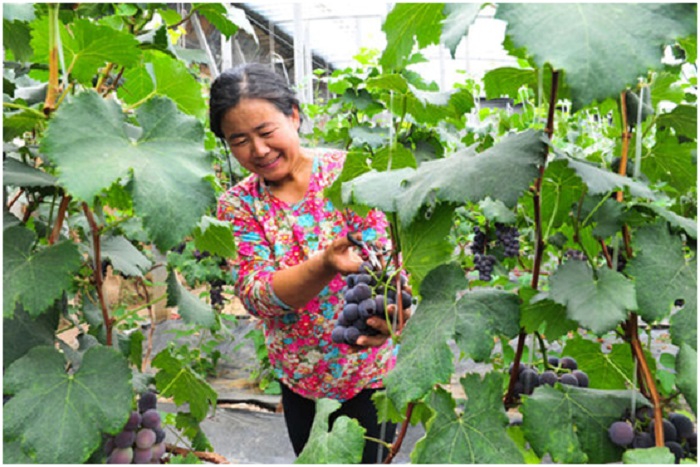



Thanks to smart agricultural technologies, famers in Anqiu city of East China’s Shandong Province are now using mobile phones to control irrigation and fertilization systems in farmlands and checking the growth of crops with computers at any time they want.
In an agricultural industrial park powered by tech giant Foxconn’s smart agricultural Internet of Things (IoT) in Guanzhuang township, Anqiu, grapevines and soil can “inform” the growers of their water demand through a small sensor installed at the roots of the plants.
“It is a stemflow sensor used to measure the everyday amount of water evaporation of each grapevine. The sensor helps us know how much water a grapevine needs every day. And through big data analysis, we can make sure that the plants get enough water they need while ensuring that not a drop of water is wasted every time we water the plants,” Wang Baojie, general manager of the industrial park explained.
“All the high-standard greenhouses in the industrial park are managed by Foxconn’s smart agricultural IoT,” Wang said, adding that the advanced IoT-based smart farming will yield rich fruits here once completed.
As the high technologies that once seemed out of reach have become increasingly common in farmlands, more and more farmers in Anqiu are enjoying the benefits of them.
Wang Guizhi, a 67-year-old farmer in Anqiu, can now easily manage a greenhouse of over 4 mu (2,667 square meters) on her own – A mobile phone is all she needs to control the irrigation and fertilization systems.
In Xiwangliju village, Shidui township of Anqiu, local farmers have transplanted more than 50 mu of green onion seedlings by automated machinery manufactured by domestic agricultural technology company Shandong Wohua Agricultural Science and Technology Co., Ltd.
The company’s planting and harvesting services for each mu of the seedlings cost around 3,000 yuan ($428.7), which is at least 500 yuan cheaper than manual labor, Zhao Zhike, a local farmer told the People’s Daily.
The machinery of Shandong Wohua Agricultural Science and Technology Co., Ltd. have fully realized precision seeding, said Liu Kai, chief technology officer of the company, referring to the seedling trays in the industrialized nursery center of the company.
In the past, it took two people a whole day to sow seeds in each mu of farmland, while now a machine can plant seeds in eight to ten mu a day, according to Liu, adding that the company provides farmers with relevant services needed for the whole industrial chain, including seed pellet granulation and coating, precision drilling, industrialized seedling cultivation, and transplanting with automated machinery.
The company has so far planted green onions in more than 30,000 mu of farmland with its automated machinery, providing services for over 3,000 households cumulatively.
Besides cultivation, Anqiu has also made efforts to tap into high technologies for the sale of agricultural products.
It has established a public service platform to boost targeted supply of agricultural products according to demand. Local people can upload information about their products on the platform and then prepare products after receiving orders online.
The platform is designed to benefit rural households through a three-level e-commerce service system consisting of households, towns, and counties, enabling them to match with the market, join e-commerce activities, supply products and expand marketing capabilities, said Ma Yuyou, who is in charge of the project.
So far, Anqiu has opened 1,229 village-level shops on the platform, attracting more than 900 kinds of products and 41 companies, and benefiting 191,000 households.
The sales volume of agricultural products achieved on the platform had reached 46.41 million yuan by the end of June, helping increase the income of local households and villages by 3.05 million yuan, with the highest income growth for poor households exceeding 3,000 yuan.


The Executive and members of the.


The Acting Director, FCT Directorate of.


President Bola Ahmed Tinubu has been.



Barely a month after resignation of.


An Abuja based Legal Practitioner, Osuagwu.



Convener of Equitable Remedy, Mrs. Magaret.


Contractors handling the contract for city.


Nigerian government may have concluded plans.


The Diplomatic Correspondents Association of Nigeria.


A rights group, “Follow Me Talk.
Leave a Comment